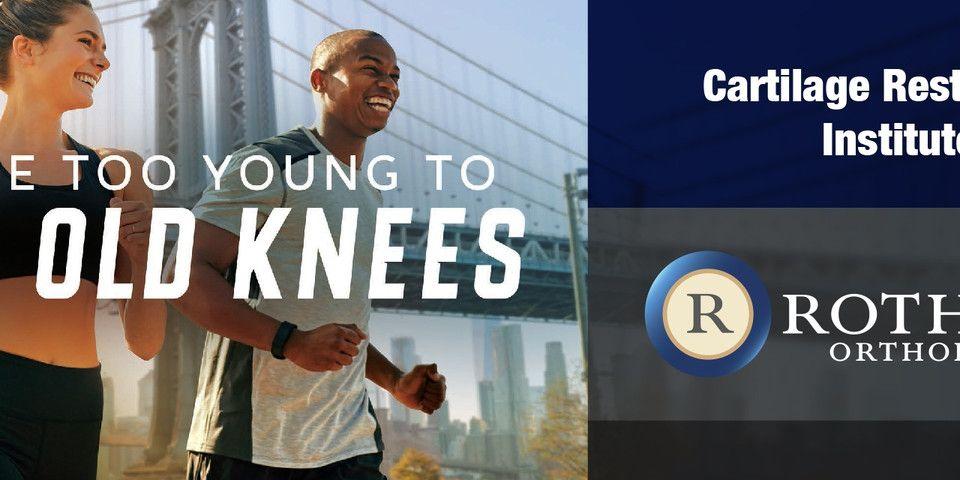Everything You Need To Know about Total Knee Replacement Surgery in Lower Manhattan
The First Step? Finding a Trustworthy Orthopaedic Knee Doctor
You’ve been to a knee specialist, done the imaging tests, and now you’ve received your results. Whether you’ve sustained an injury or have a case of osteoarthritis, the painful outcome is identical. Whereas a normal knee benefits from the presence of cartilage, a diseased or injured knee is missing some of this vital structure. And without the cushioning and stability it provides to the joint, the knee bones will rub against each other, causing pain and loss of mobility.
When non-surgical treatments have been exhausted, knee replacement may be the best option. At Rothman Orthopaedic Institute, we perform thousands of total knee replacement surgeries in Lower Manhattan, Pennsylvania, and New Jersey each year. While any surgical procedure has risks, joint replacement is an especially safe and effective surgery. If you have progressed as far as you can with non-surgical treatments such as physical therapy, anti-inflammatory drugs, and injections, total knee replacement surgery in Lower Manhattan might work for you.
Who Gets Total Knee Replacement Surgery?
Are you a candidate for a knee replacement procedure? Those who do may experience some of these symptoms:
-
Constant knee pain, even without exertion
-
Chronic swelling and inflammation that does not recuperate with rest and medication
-
Knee stiffness that limits everyday activities, such as walking, climbing stairs, and standing up/sitting down
-
Knee deformity, with the knee bowing inwards or outwards
-
Failure to improve with other treatments such as those named above
Evaluation by an Orthopaedic Knee Doctor
Any candidate for knee surgery will need to talk with their doctor to learn the potential risks and benefits of the procedure. You will be asked to complete a medical history, get X-rays, and may be asked to do additional testing, such as advanced imaging. Your knee doctor will evaluate the favorability of surgery based on all these factors taken together. You’ll have the opportunity to discuss whether surgery is the best method to relieve your pain and what should— and shouldn’t— be expected from this operation.
Knee Replacement Surgery: What to Expect
Over 90% of people who undergo this surgery experience a dramatic reduction in knee pain and a significant improvement in knee functioning. And at Rothman Orthopaedic Institute, we have a 98% success rate for 10 years after the operation! However, it’s important to realize that surgery has limited restorative power. Patients should not anticipate running or participating in high impact sports following knee replacement. However, we do recommend walking, swimming, golf, light hiking, bicycling, ballroom dancing, and other low impact activities.
Following your knee surgery, you should expect to spend several months in physical therapy and rehabilitation. It takes time to for your body to redevelop the muscles and coordination necessary for optimal knee performance.
Where to Go for Total Knee Replacement Surgery in Lower Manhattan?
Rothman Orthopaedic Institute is a world-class provider of knee replacement surgery. Our surgeons are highly-trained professionals at the forefront of their fields, performing numerous replacement procedures annually. We have recently opened our office in Lower Manhattan, and we look forward to being able to serve the patients of New York City with the highest quality orthopaedic care.
To learn more about what makes Rothman Orthopaedic Institute unique, please visit our website. You can also contact us for an appointment by calling 1-800-321-9999.
Related Specialties
Related Treatments
Related Programs
-

Cartilage Restoration Institute
This is a center where patients can go to have their disabled joint biological resurfaced, realigned, and stabilized without having the joint replaced by artificial materials such as metal and plastic. It is well known that the outcomes of patients under the age of 50 undergoing artificial joint replacement are not as good as we would like. Therefore we feel the future of Orthopaedics is to try to restore a joint back to its original anatomy by realignment, ligament reconstruction, and cartilage restoration.Read More




